In November 2014 KFA was asked for help in rescuing, vetting, and placing two sisters found in a government animal shelter in Oradea, Romania.
Background:
The decades old problem of dogs in the streets of Romania is difficult for Westerners to grasp. This article will help: Street dogs in Bucharest.
A couple years ago a program of “neuter and return” rather than “capture and kill” in the municipality of Oradea was financed by NGOs and became an example of how to successfully solve the excess dog problem. Funding ended and control was returned to the city and a company was selected to run the program and the shelter.
Reports now are that life at the shelter is not much better than on the streets and dogs not adopted quickly will become sick be destroyed.
When KFA was contacted about the girls in the shelter, we honestly didn’t know what we could do from so far away, but with the friends we’ve made over the years, finding a new home for the girls didn’t take very long. The parents of Kuvasz Fancier of America supporters in Los Angeles still live in Romania and found a friend with a farm willing to take both girls.
Now “all” that needed to be done was get them healthy and do the adoption paperwork.
At the shelter
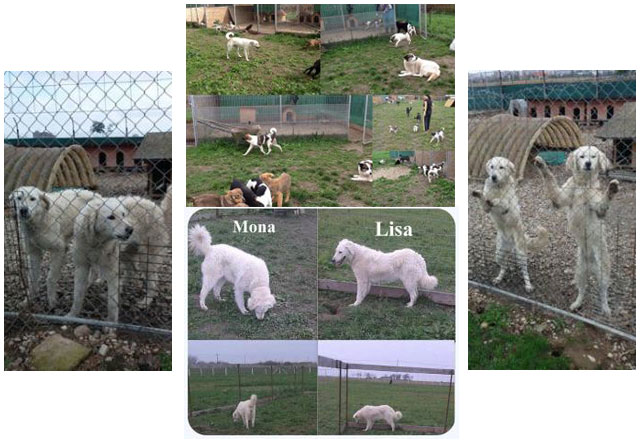
Leaving the shelter
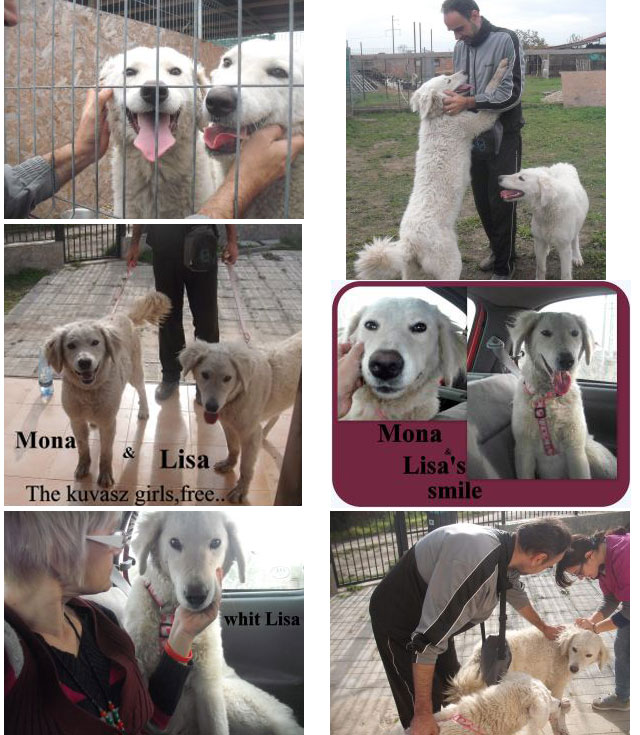
At the boarding facility getting healthy
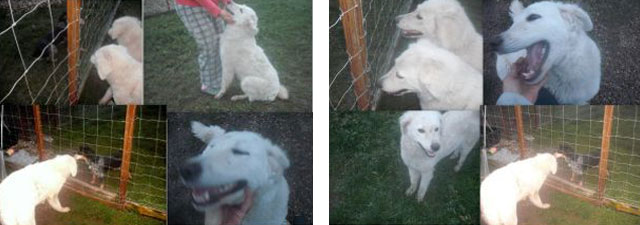
Week 2 at the boarding facility
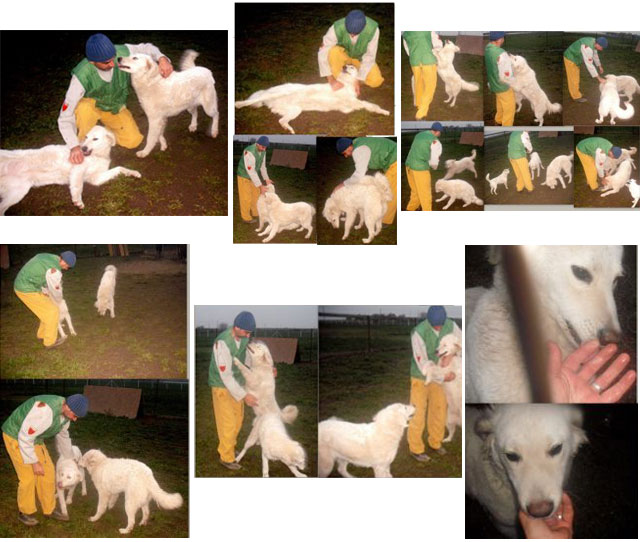
Getting ready to go to our forever home
(Mona & Lisa are so happy to see Csaba that they jump on him and make his work clothes all muddy. Now he knows to wear his worst clothes when visiting!
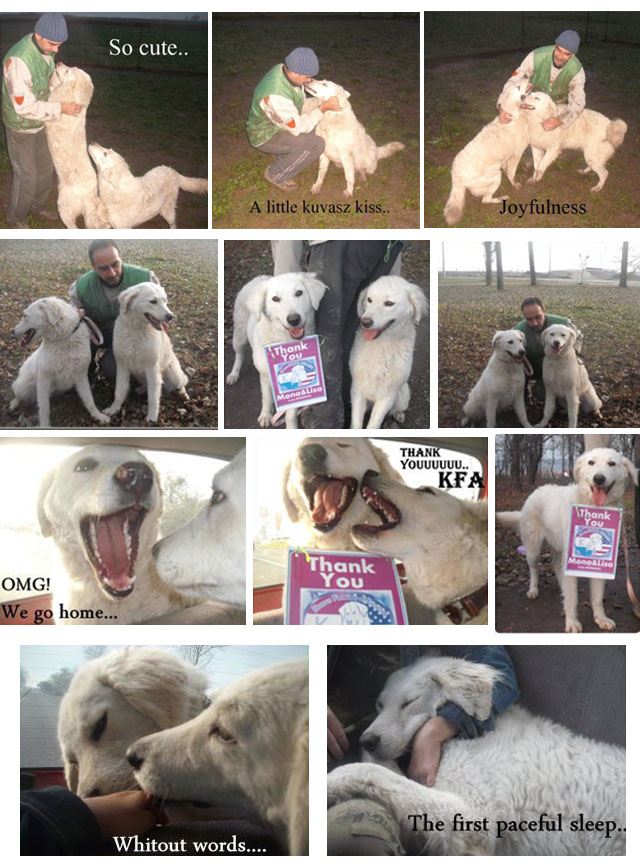
I asked Anni to try and explain to Americans why it seems as if Romanians have such a disregard for dogs.
This word is poverty, but not typical of the whole nation, but who have no school, live in poor area, unemployed people. I think is not disregarding.It is indifference, apathy. but mostly ignorance.
Ten years ago it was not so when I was a child, I could barely see stray dogs. The problem of the dogs began in the 80s. Their hard street destiny was prepared by Nicolai Ceausescu , an owner of a few black Labradors fed with veal. On the order of Ceausescu small villages were destroyed and people were moved to apartments. Rural houses with gardens had to be exchanged for small apartments, in which dogs were not likely seen. Thousands of dogs landed on the streets. The dog population started to grow very quickly.
The situation of Romanian stray dogs has been weak for years if not decades, but a couple of months ago things got worse. Animals in Romania often are treated like items less or more useful.
Animal welfare has no place in Romanian society. The European Union has recommended Romania to follow the guidelines by the World Health Organization and The World Organisation for Animal Health concerning stray dog population management, but with no reaction from Romanian leaders.
What is important, the Romanian people go along such as the sheeps. the politicians know this. The bottom has been reached that Romanians are barbarous people and the world knows it. We got there, because of the ignorance and media manipulation.
On the streets, mothers pulled their children away when approaching a dog. What kind of adults would be these children?
Why would Romanians spend more effort destroying and stealing the equipment that was meant to clean up their own streets?
- because something is finished, it is no longer possible to collect donations
- because the stray dog business is so good keeping,who make it,that have no interest in it to end
- corrupt officials and fake animal rescuers, steal, cheat, just to continue to operate this business
- on paper would build shelters, it is clear everything you think that is ultra-modern,but if you go to the scene, you’ll find a run-down shed. All is stolen before they are built.
I can not explain it better, it’s all about the money.
Unfortunately, we also the volunteers, we are classified in a group of thieves. But we just added not perish. Our plans, are not based on the calculations fom the officials ,are based on our experience.
To do more reading, check the resources here:
http://en.wikipedia.org/wiki/Street_dogs_in_Bucharest
What did KFA learn from this experience?
As an IRS 501 (c) 3 charity, your Kuvasz Fanciers of America Board of Directors takes our appeals for donations and use of your donations very seriously. Our goal is not “just” to put dogs in new homes, but to learn something we can share with others to increase the knowledge and ability of rescuers.
Because Mona & Lisa were sisters, we can assume they are from a backyard breeder in Romania who decided to dump them when he couldn’t sell them. We don’t help back yard breeders in the US get rid of their bad choices, why would we ask for your donations to help these dogs in Romania?
Honestly, Anni already committed to saving the girls, whether we helped with their expenses or not, just meant that Anni would have to spend more of her own money and wouldn’t be able to rescue the next dogs that needed her. We immediately had a home for both so they wouldn’t need to be in a foster home after they were healthy.
When we posted their story on the KFA Facebook page and started getting hundreds of “likes” from people in Serbia and Hungary, we saw a way for Anni to get support and help for her rescue group in Romania from people who were much closer and could actually be “boots on the ground”.
Of course the money raised helped Mona & Lisa, but the awareness we were able to raise via Facebook and share with Anni will give her real, practical, help when she needs it, not just money and “likes”.
KFA is looking for ways to have a steady, dependable income of donations so our fund raisers are not driven by emergencies.
A report was recently published by a NY Telemarketers group on what charities spend on fundraising. Here is what they reported about HSUS http://www.humanewatch.org/hsus-pennies-for-pets/
You can rest assured that Kuvasz Fanciers of America spends zero dollars on fundraising and the only amount deducted from your donation is the PayPal processing fee when you pay on-line.
